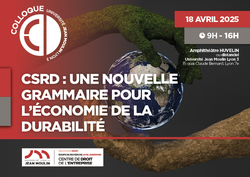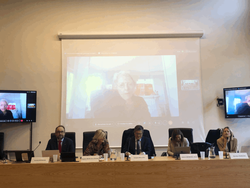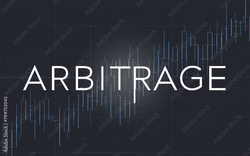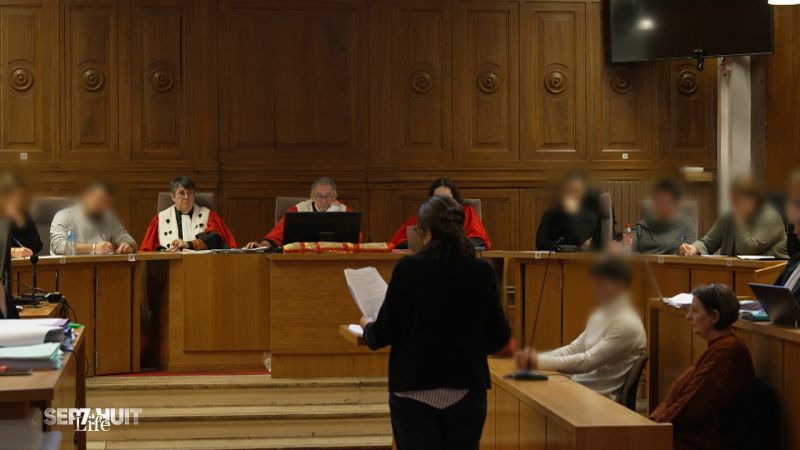The recent news

May 4, 2025
Publications

🌐follow Marie-Anne Frison-Roche on LinkedIn
🌐subscribe to the Newsletter MAFR Regulation, Compliance, Law
🌐subscribe to the Video Newsletter MAFR Overhang
🌐subscribe to the Newsletter MaFR Droit & Art
____
 ► Full Reference: M.-A. Frison-Roche, Compliance law as a Royal Road for regulating the Digital Space, Working Paper, May 2025
► Full Reference: M.-A. Frison-Roche, Compliance law as a Royal Road for regulating the Digital Space, Working Paper, May 2025
____
📝 This Working Paper is the English basis for an article written in French "Le Droit de la compliance, voie royale pour réguler l'espace numérique", in 📕
____
► Summary of this Working Paper: In order to describe the role of Compliance Law in regulating the digital space and to conclude that this new branch of Law is the 'royal road' to this end, this study proceeds in 6 stages. Firstly, at first sight and conceptually, there is a gap between the political idea of Regulating and the ideas (freedom and technology as 'law') on which the digital space has been built and is unfolding. Secondly, in practice, there is such a huge gap between the ordinary methods of Regulatory Law, which are backed by a State, and the organisation of the Digital Space by these economic operators, that are both American and global. Thirdly, the political claim to civilise the Digital Space remains and is growing, relying on the very strength of the entities capable of realising this ambition, these entities being the crucial digital operators themselves, seized as Ex Ante. Fourthly, it corresponds to the conception and practice of a new branch of Law, Compliance Law, which should not be confused with "conformity" and which is normatively anchored in its "Monumental Goals". Fifthly, Compliance Law internalises Monumental Goals in the digital operators which disseminate them through structures and behaviours in the digital space. Sixthly, through the interweaving of legislation, court rulings and corporate behaviour, the Monumental Goals are given concrete expression, willingly or by force, in ways that can civilise the digital space without undermining the primacy of freedom.
____
🔓read the Working Paper below⤵️
April 18, 2025
Conferences

🌐suivre Marie-Anne Frison-Roche sur LinkedIn
🌐s'abonner à la Newsletter MAFR Regulation, Compliance, Law
🌐s'abonner à la Newsletter en vidéo MAFR Surplomb
🌐s'abonner à la Newsletter MaFR Droit & Art
____
► Référence complète : M.-A. Frison-Roche, "Appréhender la CSRD à travers sa ratio legis", synthèse de CSRD : une nouvelle grammaire pour l'économie de la durabilité, colloque organisé par le Centre de recherches Louis Josserand sous la direction de Luc-Marie Augagneur, Faculté de Droit, Université Jean Moulin - Lyon 3, 8 avril 2025,
____
Cette conférence constitue l'intervention de synthèse du colloque. C'est pourquoi elle a été construite à partir d'une méthode qui lui est propre à savoir la recherche et le respect de ce qui a justifié l'adoption de la CSRD, tout en s'appuyant sur chacun des propos qui ont été présentés lors de cette journée pour en rendre compte et les mettre en perspective de cette idée.
____
🧮consulter le programme complet de cette manifestation
____
🪑🪑🪑Participent notamment également à cette manifestation :
🪑Jean-Christophe Roda
🪑Luc-Marie Augagneur
🪑Gilles Martin
🪑Grégoire Leray
____
► Résumé de l'intervention :
________
April 8, 2025
Conferences

🌐suivre Marie-Anne Frison-Roche sur LinkedIn
🌐s'abonner à la Newsletter MAFR Regulation, Compliance, Law
🌐s'abonner à la Newsletter en vidéo MAFR Surplomb
🌐s'abonner à la Newsletter MaFR Droit & Art
____
► Référence complète : M.-A. Frison-Roche, "Traduire dans l'institution judiciaire l'articulation entre l'international et le systémique" in CREDIP, Faculté de Droit de l'Université Jean Moulin - Lyon 3, Le contentieux systémique émergent, un contentieux international justifiant la création de juridictions spécialisées, cycle de conférences sur Le contentieux international et la spécialisation des juges, Lyon , 18 avril 2025, 10h-12h.
____
🪑🪑🪑Participent aussi à cette manifestation :
🪑Jacques Boulard, Premier président de la Cour d'appel de Paris
🪑Brigitte Brun-Lallemand, Première présidente de chambre de la Cour d'appel de Paris (Pôle économique)
🪑Jérémy Heymann, professeur de droit à l'Université Jean Moulin - Lyon 3
🪑Sabine Abravanel-Jolly, Professeure de droit au sein de l'Equipe Louis Josserand
🪑Marylou Françoise, maîtresse de conférences à l'Université Jean Moulin - Lyon 3
____
🧮consulter le programme complet de cette manifestation
____
► Résumé de l'intervention : cette intervention ayant eu lieu après les présentations du Premier Président Jacques Boulard et Madame la Première Présidente Brigitte Brun-Lallemand, elle s'articule sur ces deux interventions.
I. Contentieux systémique et Contentieux international. On peut ainsi se demander si la nature d'un "contentieux systémique" se prête à ce qu'est un "contentieux international" ? A première vue, non. L'on pourrait poser que, d'une part, si le "contentieux systémique émergent" était "nécessairement international", alors l'on ne comprendrait pas pourquoi la Chambre spéciale internationale de la Cour d'appel de Paris ne suffisait pas et d'autre part, l'on ne comprendrait pas comment deux jugements ont été rendus sur le Devoir de Vigilance, dont on ne conteste pas qu'il appartient au Contentieux Systémique Emergent, alors qu'ils ne portent pas sur une chaine internationale de valeur : jugement TJ Paris 5 décembre 2023 dit La Poste, cas systémique actuellement devant la chambre spécialisée de la Cour d'appel de Paris ; TJ Paris 13 février 2025, dit SNCF, cas systémique, n'ayant pas fait l'objet d'appel.
II. Deux chambres spécialisées en miroir Dès lors, l'on pourrait dire que le contentieux systémique est de fait international mais pas par nature. Parce que cela n'est pas une subdivision du contentieux international, cela explique certes que la chambre 5-12 soit autonome par rapport à la chambre 5-16 (chambre internationale), mais parce que la perspective est de fait souvent transnationale, ces 2 chambres ont vocation à fonctionner en miroir. Car le système est un fait global. Et c'est plus en terme de fait global qu'il convient de le traiter, ce qui est plus facile dans des systèmes qui ne sont pas construit sur cette summa divisio du fait et du droit, qui convient mal au contentieux systémique.
III. Par nature, un contentieux dans lequel un système est "impliqué". Cela nous amène donc vers la définition du "Contentieux Systémique Emergent". Elle est simple : c'est un Cause dans laquelle un système est impliqué, dans lequel les intérêts de celui-ci sont en jeu, le premier de ses intérêts étant sa survie. C'est pourquoi la durabilité est une notion-clé, que l'on retrouve quelque soit le système impliqué. C'est pourquoi l'avenir est présent dans le contentieux systémique. C'est pourquoi l'office du juge est renouvelé car il s'agit d'un office Ex Ante, renouvellement à la fois procédural et substantiel qui conduit en pratique à un Droit processuel. Le fait systémique mène donc de droit à une dialogue des juges qui se spécialisent sur des faits globaux et les obligent, sauf à méconnaître ceux-ci, à se prendre en considération. Cela donne un nouveau statut au "droit comparé".
IV. Un contentieux émergent par le fait de systèmes nouveaux, globaux, saisis par des opérateurs locaux qui en fixent la stratégie. Les systèmes ont déjà donné lieu à des contentieux : c'est la juridictionnalisation du Droit de la Régulation. Mais la Régulation a quitté ce prérequis des systèmes pour entrer à l'intérieur des opérateurs économiques dont le pouvoir de stratégie est situé localement. Le Droit de la Compliance internalise les besoins systémiques. Le Droit de la Compliance dont on affirma, parce qu'Ex Ante, qu'il allait dispenser du Juge, s'est lui-même juridictionnalisé. L'obligation de vigilance étant elle-même la pointe avancée de la Compliance, ne pouvait que donner une large place au Juge. Tandis que le système est l'enjeu du procès et de sa bonne solution, la partie au litige est l'opérateur cruciale : non seulement les entreprises régulées (comme les banques) mais encore les entreprises maîtresses des chaines de valeur (ce qui fait sortir le Droit de la Régulation des secteurs régulés). Or, les chaines de valeur sont un espace global contractuellement structuré transnational rattachées à un juge local qui est confronté à un office renouvelé avec le DIP.
V. Une culture juridictionnelle propre à des zones distinctes. Le Droit de la Vigilance, de la Compliance et de la Régulation tel qu'on le voit manier par les juges dépasse nos distinctions entre droit public et droit privé, entre les systèmes juridique, mais les décisions que l'on lit expriment trois cultures, procédurales et substantielles, différentes : l'Asie, les Etats-Unis et l'Europe. Cette culture de place porteuse d'une identité européenne de Vigilance, de Compliance et de Régulation repose notamment sur une culture juridictionnelle propre à cette zone-là.
________

April 5, 2025
Publications

🌐follow Marie-Anne Frison-Roche sur LinkedIn
🌐subscribe to the Newsletter MAFR Regulation, Compliance, Law
🌐subscribe to the Video Newsletter MAFR Surplomb
____
 ► Full Reference: M.-A. Frison-Roche, Arbitration, a highly appropriate technique for deploying Compliance Law, in particular to satisfy the Vigilance Obligation, Working Paper, March 2025.
► Full Reference: M.-A. Frison-Roche, Arbitration, a highly appropriate technique for deploying Compliance Law, in particular to satisfy the Vigilance Obligation, Working Paper, March 2025.
____
🎤 This Working Paper was developed as a basis for the Overhang👁 video on ... April 2025 : click HERE
____
🎬🎬🎬In the collection of the Overhangs👁 It falls into the Notion category.
►Watch the complete collection of the Overhangs👁 : click HERE
____
► Summary of this Working Paper: If Arbitration has so far not developed much in Compliance Law, it is because this new branch of Law is not well known. Indeed, if it were simply a matter of 'conformity' with mandatory regulations, then Arbitration involving rights that are freely available to the parties and Compliance would be 2 worlds that must ignore each other.
But Compliance Law is defined quite differently. Its normativity lies in the Monumental Goals set by the political authorities, which oblige large companies, because these compagnies are in a position to do so, to contribute to achieving these Goals, namely the future preservation of the Systems (banking, digital, climate, energy, etc.) and human beings involved. While the Goal is constrained, the company is free to choose the means, as long as these means are credible. Arbitration is one of them. From the arbitration clause to the appropriate award.
One example is the Duty of Vigilance, the cutting edge of Compliance. In order to effectively find solutions in the value chain that the company governs, Arbitration is a suitable means of achieving the Monumental Goals of environmental protection and human rights, under the control of the Judge.
____
🔓read the developments below⤵️

March 29, 2025
Publications

🌐follow Marie-Anne Frison-Roche sur LinkedIn
🌐subscribe to the Newsletter MAFR Regulation, Compliance, Law
🌐subscribe to the Video Newsletter MAFR Surplomb
____
 ► Full Reference: M.-A. Frison-Roche, The Contract, a Compliance tool: the Obligation for a platform to control content CE, 27 January 2025, B. c/ CNIL, Working Paper, March 2025.
► Full Reference: M.-A. Frison-Roche, The Contract, a Compliance tool: the Obligation for a platform to control content CE, 27 January 2025, B. c/ CNIL, Working Paper, March 2025.
____
🎤 This Working Paper was developed as a basis for the Overhang👁 video on 29 March 2025 : click HERE (in French)
____
🎬🎬🎬In the collection of the Overhangs👁 It falls into the News category.
►Watch the complete collection of the Overhangs👁 : click HERE
____
► Summary of this Working Paper: The ruling handed down on 15 January 2025 by the Commercial, Economic and Financial Chamber of the French Judicial Supreme Court (Cour de cassation) provides a solution to the issue of content control in the digital environment. It resolves what appears to be the aporia so often emphasised, and even claimed, namely the impossibility of developing an effective controlling technology.
To do this, the Court disregarded the applicable laws and referred to the electronic payment contract between the bank and the platform, which contained a clause on Vigilance against unlawful content, linked to a termination clause. It held that this clause was fully effective. This solution, so simple and so strong, can make a major contribution to regulating the digital space, if the banks so wish, because what platform can do without reliable electronic payment services?
____
🔓read the developments below⤵️
Updated: March 25, 2025 (Initial publication: Feb. 13, 2025)
Hearings by a Committee or Public organisation

🌐follow Marie-Anne Frison-Roche on LinkedIn
🌐subscribe to the Newsletter MAFR Regulation, Compliance, Law
🌐 subscribe to the Video Newsletter MAFR Overhang/Surplomb
____
► Full Reference: M.-A. Frison-Roche, hearing before the French working group on the modernisation of French Arbitration Law, about the issue Arbitrage et Droit de la Compliance : est-il besoin d'un texte ? ("Arbitration and Compliance Law: is a text required?"), Directorate of Civil Affairs' French Ministry of Justice, 13 February 2025.
____
► Result of this presentation and the ensuing discussion, recorded in the working group's report published in March 2025 (published in French, translated her: "This report on the guiding principles would not be complete without mentioning the discussions in the working group on the introduction of a guiding principle requiring the arbitral tribunal to take into account "human, environmental and compliance issues, as well as respect for the fundamental rights and freedoms of the parties".This proposal gave rise to particularly heated discussions. Some saw it as a scarecrow likely to make French Arbitration Law less attractive and to weaken Arbitration awards, opening up cases of recourse on the pretext of bad faith, even though these values would already be taken into account in the review of domestic or international public policy. Others, on the other hand, felt that such a text would have the advantage of enshrining an Arbitration Law connected to values that are not exclusively economically oriented, pointing out, moreover, that such a principle would not be redundant with the control of public policy, which intervenes ex post, whereas this text imposes Ex Ante responsability, and that this principle would allow a noteworthy introduction of Compliance Law in rbitration. They added that the promotion of such values could make it possible to demonstrate a commitment to virtuous arbitration practice. In the light of these differences, after much hesitation, the decision was made not to include it in the draft Code, considering that the final choice was more a question of political dimension that the working group felt it could not decide on its own. ". (p. 36).
____
► English Summary of the presentation: My presentation deals with the relationship between Compliance Law and Arbitration, particularly International Arbitration. It is built around 12 successive points. The work I have carried out on these various points is associated with it. It precedes the answers I shall give to the questions put by the members of the working group and the ensuing discussion.
1. stagnation in the relationship between Arbitration and Compliance Law, due to continuing misunderstandings about Compliance
2. progress towards a better understanding of Compliance and the appropriateness of the arbitrator's role within Compliance Law
3. prospects for the growing relationship between Compliance Law and Arbitration, particularly with regard to the value chains built up by international companies
4. educational issues
5. time required to build a "culture of place" in this matter
6. "Doctrinal" difficulties
7. benefit from the production of a "doctrine of place" on this subject
8. going beyond the continental summa divisio of Public Law and Private Law
9. practical assimilation of Regulatory Contracts in sustainable sectors and chains
10. opening up the Arbitration World to this articulation with Compliance Law
11. Can an official legal text contribute to this?
12. example of the guiding principles of the French Code of Civil Procedure.
____
🔓read the presentation developments below⤵️
March 25, 2025
Conferences

🌐suivre Marie-Anne Frison-Roche sur LinkedIn
🌐s'abonner à la Newsletter MAFR Regulation, Compliance, Law
🌐s'abonner à la Newsletter en vidéo MAFR Surplomb
____
► Référence complète : M.-A. Frison-Roche, "En tant que juriste, que retenir de J'accuse", in Autour du film J'accuse, Cour d'appel de Paris, 25 mars 2025, 17h-20h.
____
Après la projection du film
____
🧮consulter le programme complet de cette manifestation
___
► Présentation de l'intervention : mars
- Y avait-il une fatalité : 1.pour le mal / 2. pour le bien (et quelle place les juristes y ont joué ?
- Aujourd'hui : 1. retrouve-t-on des éléments analogues 1. pour le mal / 2. pour le bien (et quel place les juristes doivent y jouer :
- la législation sur l'incrimination de l'antisémitisme ; le Parquet ; la politique pénale
- les réseaux sociaux
- les avocats, les procureurs, les juges, les professeurs
- l'articulation entre les juristes et les non-juristes
________
March 23, 2025
Law by Illustrations

🌐suivre Marie-Anne Frison-Roche sur LinkedIn
🌐s'abonner à la Newsletter MAFR Regulation, Compliance, Law
🌐s'abonner à la Newsletter en vidéo MAFR Surplomb
► Référence complète : M.-A. Frison-Roche, "Pour juger un acte, il faut plonger dans les récits contradictoires des uns et des autres. En cela tout procès est "atypique"🎬documentaire Le procès", billet mars 2025.
____
___
Le procès est un documentaire, diffusé sur TF1 le dimanche 23 mars 2025. Il porte sur un procès pour meurtre qui se déroule devant la Cour d'assises du Gard. Celui-ci est présenté comme "atypique", en ce que la victime y semble presque absente, son objet étant davantage la relation entre l'auteur du meurtre et sa mère (I). Il en ressort que juger des actes, celui du fils mais aussi celui de la mère, suppose la reconstitution crédible des faits, ce qui suppose aussi de comprendre les êtres humains impliqués (II). Tout procès est ainsi construit, mais l'on peut affirmer aussi que tout procès est atypique (III). Ce que la passion des algorithmes doit considérer.

I. UN DOCUMENTAIRE SUR UN PROCES D'ASSISES ATYPIQUE : SON OBJET EST LA RELATION ENTRE L'AUTEUR DU MEURTRE ET SA MÈRE
La chaine présente le documentaire : "vous verrez le procès comme si vous y étiez".
Le procès d'assise qui est déroulé à la Cour d'Assises de Nîmes est présenté dans l'ordre chronologique, la voix off rappelant quelques règles élémentaires, par exemple la désignation des jurés.
Il est aussi présenté comme "atypique", car le sujet n'est pas tant le meurtre lui-même mais les rapports entre l'auteur du meurtre et sa propre mère, qui est la compagne de la victime. En effet, le fils soutient qu'il a battu avec une batte de base-ball celui-ci pour le dissuader de continuer à battre sa mère et que, descendant de la chambre après l'avoir battu, il en informe sa mère. Mais sa mère a une version différente des faits, pour justifier notamment le fait qu'elle ne se soit pas déplacée pour aller voir l'état de la victime, affirmant qu'elle n'a pas vu cette batte.
Les psychiatres confirment ce caractère atypique en raison de la relation entre la mère et le fils, celui-ci ne pouvant assumer le rôle de protecteur qu'on exige de lui. Le psychiatre observe que la perte de contrôle que traduit le geste en est la conséquence.
Quant à elle, la mère dit qu'elle n'avait pas compris ce qui se passait. Elle est elle-même poursuivie pour délit de non-assistance à personne en danger.
Le documentaire considère que le sujet est donc la relation entre la mère et le fils, Cette relation est décrite comme fusionnelle, le fils étant instituée comme chef de famille tandis que la mère est dans un état de dépression permanente. Les témoins décrivent la mère comme étant "toxique", ne concevant pas que son fils puisse exister en dehors d'elle, le fils se sacrifiant. Des témoins considèrent que la mère serait manipulatrice.
II. JUGER UN ACTE SUPPOSE LA RECONSTITUTION CRÉDIBLE DES FAITS ET DE COMPRENDRE LES ETRES HUMAINS IMPLIQUÉS
Ce cas ainsi exposé montre d'une façon extrême que l'on ne peut juger les actes (le meurtre par le fils, la non-assistance à personne en danger par la mère).
La question de preuve, et les qualifications qui en découlent, est la suivante : celle des intentions. En effet, l'intention de tuer est en cause, l'avocate de l'accusé demandant pendant l'audience la requalification en blessures mortelles ayant entrainé la mort sans l'intention de la donner. De la même façon, l'intention de la mère de ne pas agir, voire l'intention d'utiliser son fils.
L'écoute des questions, des réponses, montre la difficulté de reconstituer ce qui est exact, ou à tout le moins crédible, dans les faits évoqués par les personnes, et plus largement les récits articulés par les uns et les autres.
Il ressort des uns et des autres que c'est le récit global de la mère qui est le moins crédible.
III. UN PROCÉS ATYPIQUE, DES EXIGENCES ET MÉTHODES PROBATOIRES COMMUNES
Ce que l'on peut retenir dans ce que ce documentaire porte sur la crédibilité des récits.
En effet, comme le rappelle l'Avocat général : "on n'est jamais dans la tête des gens". C'est pourquoi l'Avocat général récuse avec force la demande de requalification et rappelle la définition juridique de l'intention criminelle.
De la même façon, l'avocate de la mère rappelle que celle-ci n'est pas poursuivie pour avoir été une "mauvaise mère". Elle a sans doute une "responsabilité morale", qu'elle a reconnue, mais elle n'a pas de responsabilité juridique, l'avocate soulignant qu'il ne faut pas confondre Droit et Morale.
Ce qui est remarquable est qu'à ce titre ce procès qui est présenté comme "atypique" est comme tous les autres procès, non seulement les procès pénaux mais les procès civils.
Cet entrechoc des récits est ainsi raconté par Eliette Abécassis à travers son roman Divorce à la française.
______